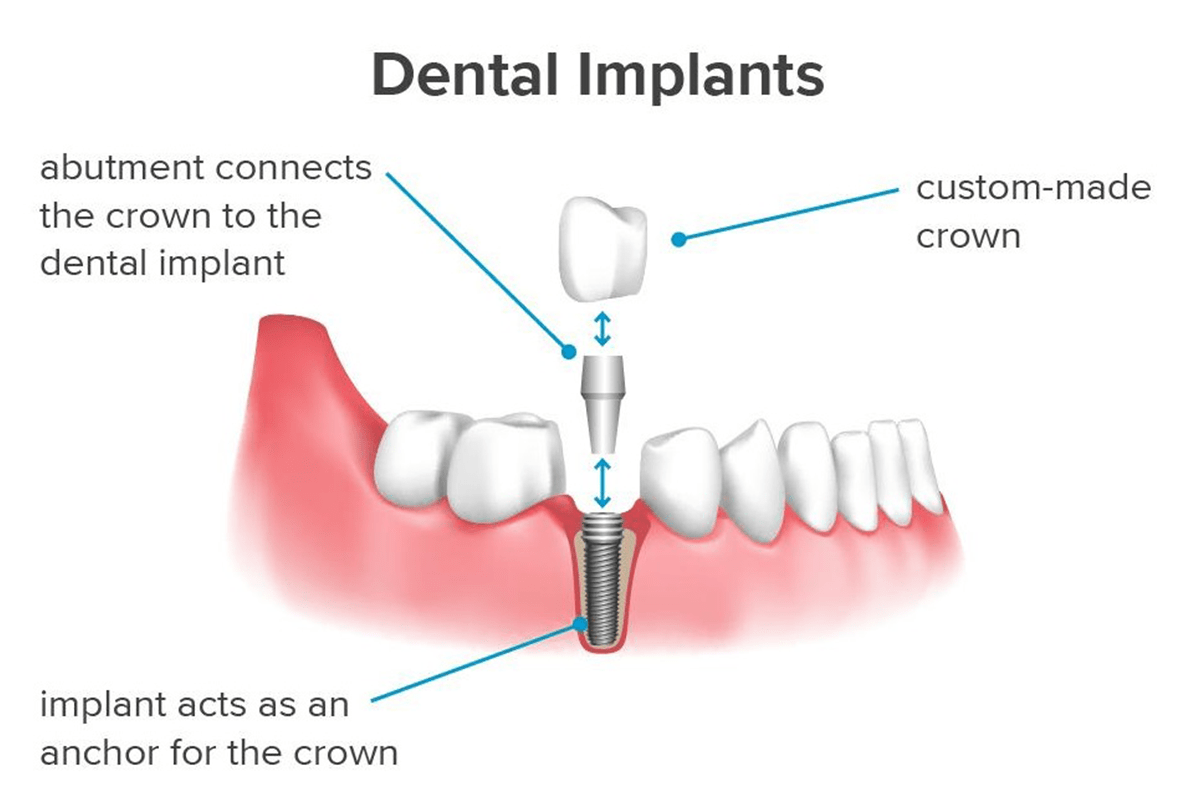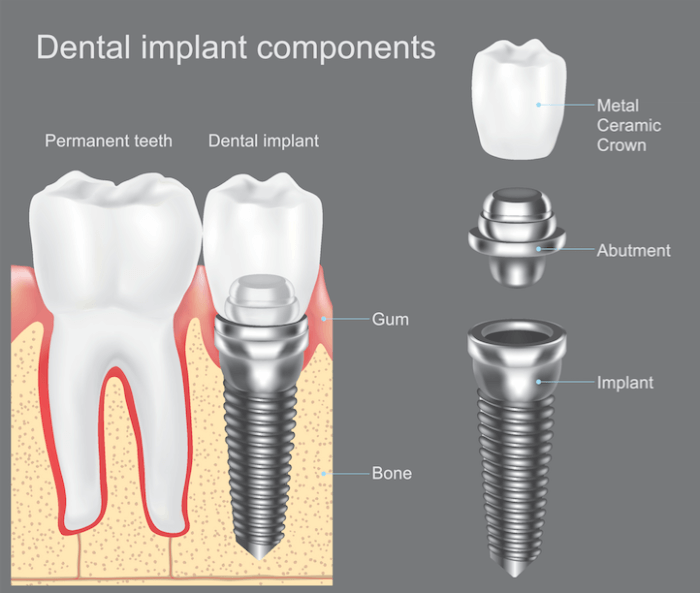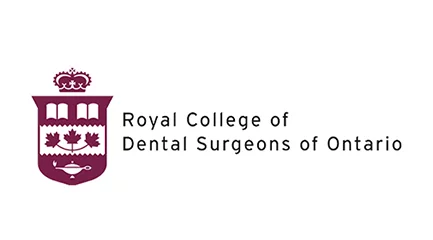Dental implants are often seen as a long-term solution to replacing lost teeth. But what are the benefits and what are risks? In this article, we’ll explore some of the reasons why people decide to have dental implants, and help you make an informed decision about whether or not they’re the right solution for you.
THE BENEFITS OF DENTAL IMPLANTS:
There are many reasons why people choose to have dental implants. The benefits of dental implants include:
- They are more secure than traditional dentures and can last up to 10 years without needing replacement.
- They offer a natural-looking appearance that is easier to maintain than traditional dental treatments, such as fillings and crowns.
- They are less likely to experience pain or discomfort than with other treatments.
- They can help people regain their confidence in their smiles.
DENTAL IMPLANTS PROCEDURE:
Here are some more details about the dental implants procedure:
- The first step in getting implants is scheduling book an appointment with your dentist. During this appointment, your dentist will explain the procedure and answer any questions you may have. He or she will also provide you with a written estimate of the cost of the implant surgery.
- After you have had a chance to review the estimate, your dentist in London Ontario will likely ask you to sign a consent form authorizing the surgery. This form will list all of the risks associated with implants and outline what steps you should take if anything goes wrong during the surgery.
- The actual surgery itself is relatively painless. Your dentist will place metal plates into your jawbone on either side of your missing tooth(s). These plates will serve as anchors for implants that are to be inserted later on.
RISKS ASSOCIATED WITH DENTAL IMPLANTS:
Dental implants are one of the most popular dental procedures in London, Ontario . They are also one of the most common procedures that lead to complications. Before you have implants, it is important to understand the risks associated with them. There are a number of risks associated with implants, including: infection, rejection, failure, and nerve damage.
There is also a risk of developing a serious infection if the implant is not properly cleaned or if it becomes infected. If this infection travels to your mouth, it can cause serious problems, including tooth loss. Rejection is another potential complication associated with implants. If the implant is not properly placed or if it becomes infected, your dentist may have to remove it. This can be a very traumatic experience and may lead to additional complications, such as pain and difficulty chewing and speaking.
Failure can also occur if the implant fails due to corrosion or decay. If this happens, your dentist may need to replace the implant with a new one. Damage to your nerves can also occur as a result of implants. This can lead to pain and difficulty speaking and chewing. Dental implants are often considered safe when used in conjunction with regular oral care and treatment.
PREPARATION FOR DENTAL IMPLANTS:
If you’re considering implants, there are a few things you should do before your appointment. Here’s what to consider:
1) Make sure your mouth is healthy: If your gums are healthy, the metal of the implant will adhere more firmly to your jawbone. If your gums are unhealthy or have receded teeth, a dental implant may not be the best option for you.
2) Check for bone loss: If you have lost bone in your jaw, a dental implant may not be the best option for you. implants require metal to be securely anchored in bone, so if there is too much bone loss, the implant may not hold up well over time.
3) Discuss other options with your dentist: If a dental implant is not right for you based on your health history or current oral condition, discuss other options with your dentist. There are many other types of implants that may be a better fit for you.
DENTAL IMPLANTS ARE A COMMON SOLUTION FOR PEOPLE WHO HAVE LOST TEETH:
Dental implants are a common solution for people who have lost teeth because they are:
- Totally removable and can be replaced if needed
- More stable than natural teeth
- Less likely to decay or become lost
- Typically more affordable than other options
WHAT TO LOOK FOR WHEN CHOOSING A DENTAL IMPLANT?
There are a few things to look for when choosing implants. The type of implant, the size of the implant, and the material make up the majority of the considerations. Implants come in various types, including osseointegrated and non-osseointegrated.
Osseointegrated implants are inserted directly into the bone, while non-osseointegrated implants sit on top of the bone and are screwed in. Implants made out of different materials include titanium, stainless steel, and ceramic. Each has its own advantages and disadvantages; titanium is strong but can be fragile, stainless steel is durable but can be heavy, and ceramic is lightweight but may not hold up as well over time. Additionally, some people choose to have multiple implants to increase their stability.
HOW DENTAL IMPLANTS ARE INSERTED?
Implants are small, titanium devices that are implanted into the jawbone to replace teeth that have been lost or damaged. The implants are surgically inserted into the bone and then connected to a wire frame, which is held in place by a set of screws. The implant is slowly adjusted to ensure a perfect fit. Once it is in place, the wires are tightened and the implant becomes permanently fixed to the bone. Unlike traditional dental braces, which require periodic adjustment and removal, implants can stay in place indefinitely.
Implants offer many benefits over traditional dental methods:
- They are more durable and last longer than teeth replacement with crowns or bridges.
- They provide a more natural appearance than dental braces or dentures.
- They are less likely to cause pain or discomfort.
AFTER DENTAL IMPLANTS ARE INSERTED:
Dentists typically use dental implants in the jawbone to replace teeth that have been lost or damaged. Implants are designed to last for a long time, and can provide a more stable foundation for teeth replacement. There are many reasons some people choose to have dental implants, including:
- A need for more stable teeth and jawbones due to damage from age or trauma.
- A desire for a natural-looking smile that is more consistent and predictable over time
- A need for better oral health due to conditions like oral cancer or tooth decay
THE COSTS OF DENTAL IMPLANTS:
Implants are a luxurious option for people who want to improve their smile. Implants can be costly, but there are many ways to reduce the cost of implants. Here are four tips to help you get the most out of your dental implant cost:
- Compare prices between dental implant providers. There is no one right answer when it comes to the cost of implants, as prices will vary depending on the provider, location, and type of implant. However, you can save money by comparing prices between different dental implant providers.
- Look for discount codes and deals. Many dental implant providers offer discounts and deals to customers who use their services regularly. You can also look for discount codes online or in magazines.
- Don’t forget about financing options. Many dentists offer dental implant financing plans that can help you pay for your implants over time. You may also be able to get a mortgage or credit card to help finance your dental implant purchase.
- Ask your dentist about special discounts and offers specific to implant patients. Many dentists offer special deals and discounts just for patients who have undergone implants surgery.
DENTAL IMPLANT CONSULTATION:
Some people choose to have implants, a metal or plastic device that is placed into the jawbone to provide support and allow teeth to be restored. Implants can be either traditional (crowns and bridges) or modern (implant-supported dentures). There are many reasons why someone might choose to have implants, including:
- Having difficulty with removable dentures;
- Restoring missing teeth;
- Reducing or eliminating the need for multiple fillings and root canals;
- Improving oral health due to improved stability of the teeth;
- Resolving problems with chewing and speaking.
CONCLUSION:
The decision to have implants is a big one and should not be taken lightly. There are many pros and cons to consider before making this life-altering decision. Some people choose to have implants because they believe they look better with them and they feel more confident. They can also be replaced if something happens to them, like decay or a fracture. If you are considering dental implant surgery, it is important to speak with a qualified dentist about your options.












